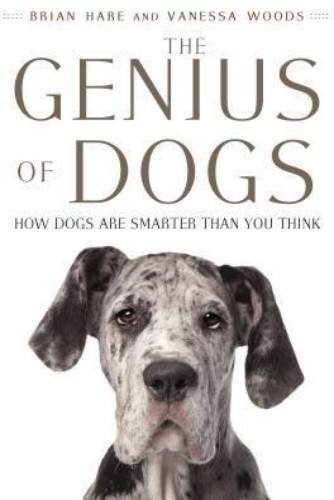
The Genius of Dogs
How Dogs Are Smarter than You Think
کتاب های مرتبط
- اطلاعات
- نقد و بررسی
- دیدگاه کاربران
نقد و بررسی

November 12, 2012
Arguing against the common assumption that a domesticated animal is somehow also a weaker, less intelligent one, Hare and Woods present a scientific study that doubles as a warmhearted tribute to man’s best friend. The authors evaluate animal intelligence primarily on the basis of a species’ success in surviving, finding the canine intellect on that count to be closely suited to coexistence with humans. Domestication has resulted in animals “more like infants than wolves” that can make inferences about human behavior and learn human vocabulary. Dogs also read our gestures, anticipate our desires, and better the quality of our lives, receiving food, shelter, and care in return. Observing that humans do not invite many other mammals to live in our homes and even sleep in our beds, Hare and Woods suggest that dogs earned this coveted spot by being our friends—a phenomenon they dub “survival of the friendliest.” The pair find that the human-
canine relationship is not as one-sided as it can sometimes seem, but delivers such benefits to humans as alleviating loneliness, lowering blood pressure, and relieving stress, while they also touch on their research’s implications for our own species.

November 15, 2012
Hare (Evolutionary Anthropology/Duke Univ.) and Woods (Bonobo Handshake: A Memoir of Love and Adventure in the Congo, 2010) delve into the rich cognitive world of dogs and how they domesticated themselves through natural selection. Dogs are the authors' special subjects--Hare founded Duke's Canine Cognition Center, and Woods is a research scientist there--and they examine the scientific studies of dogs' communication skills (from visual signals to categorization), their empathy and cooperative talents, between their ability to infer, find solutions and display flexibility. But one question the authors tackle with the greatest vigor: Why the dog at all? If dogs evolved from wolves--which were threats and competitors of humans in the carnivore guild--why did domestication become an option? What forces drove it? Hare and Woods clearly reintroduce readers to the old garbage-eater-on-the-outskirts-of-camp theory of wolves and man finding common ground but from a very specific angle. It was the friendliest of the wolves, those that could coexist with humans, that benefitted from this stable food supply. A relaxed wolf, one that had come to understand the communicative intentions of human behavior, was a wolf with more offspring. It wasn't long before wolves started to change physiologically. Their breeding cycles changed, their heads became smaller, they became distinctive to the human eye and could be ignored or encouraged. "Humans did not set out to domesticate wolves," write the authors. "Wolves domesticated themselves. The first dog breed was not created by humans' selection or breeding but by natural selection." Interestingly, the same anatomical signatures that differentiate dogs from wolves are seen in bonobos and chimpanzees and humans and their forebears. A well-presented investigation into how dogs came to be.
COPYRIGHT(2012) Kirkus Reviews, ALL RIGHTS RESERVED.

March 15, 2013
Husband-and-wife team Hare (evolutionary anthropology, Duke Univ.; founder, Duke Univ. Canine Cognition Ctr.) and Woods (Bonobo Handshake) begin their book with a history of the domestication of wolves some 10,000 to 40,000 years ago and enthusiastically posit that dogs' social intelligence developed as the friendliest wolves formed working and relational bonds with humans. Hare is a pioneer in the field of cognitive ethology (the study of animal behavior under natural conditions) who uses psychological experiments to explore canine intelligence. His research has led to significant discoveries about how dogs understand intention and inference, read human gestures, understand words, follow gaze and pointing, and solve problems through demonstration. VERDICT Along with recent titles like Jon Franklin's The Wolf in the Parlor: The Eternal Connection Between Humans and Dogs, Hare's thoroughly researched, enjoyable work will find an appreciative audience. This is essential reading for dog lovers and those who enjoy psychology and social sciences relating to animal behavior, communication, and training.--Susan Riley, Mamaroneck P.L., NY
Copyright 2013 Library Journal, LLC Used with permission.

January 1, 2013
Several monikers on the 2012 list of most popular puppy names (Max, Charlie, Lucy) have a comforting familiarity. As pets become integrated family members and people develop deeper bonds with their dogs, it makes sense that the owners would choose to name a pet as they would a human child. Loyalty and companionship are basic needs that a faithful, loving pooch can provide, but how well do you know what your dog is thinking? What motivates his actions, and how much does he actually learn through human cohabitation and observation? Husband-and-wife authors Hare (a professor of evolutionary anthropology and founder of the Duke Canine Cognition Center) and Woods (a research scientist and author) present their extensive scientific research on dognition (a playful portmanteau for dog cognition) in an informed and fetching style while pointing to the domestication of man's best friend as evidence of dogs' unique social intelligence and the survival of the friendliest. The Genius of Dogs will fascinate any dog lover who longs to gain a better understanding of our devoted canine friends.(Reprinted with permission of Booklist, copyright 2013, American Library Association.)

























دیدگاه کاربران